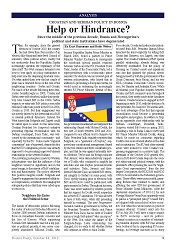
DPC BOSNIA DAILY: Croatian and Serbian Policy in Bosnia. Help or Hindrance?
Bosnia Daily: October 24, 2012 – Croatian and Serbian Policy in Bosnia. Help or Hindrance?
More...We kindly inform you that, as long as the subject affiliation of our 300.000+ articles is in progress, you might get unsufficient or no results on your third level or second level search. In this case, please broaden your search criteria.

Bosnia Daily: October 24, 2012 – Croatian and Serbian Policy in Bosnia. Help or Hindrance?
More...
In view of the key importance of inter-ethnic relations and status of national minorities in Serbia for development of democracy, Helsinki Committee for Human Rights in Serbia, Centre for Regionalism, the Vojvodina Club and Centre for Multiculturality have organised the round-table "National Minorities in Serbia" on 8 and 9 September 2000 in Novi Sad. Participants in this round-table were representatives of several dozen NGOs from Vojvodina and Serbia, representatives of political parties, prominent public personalities and experts for minority rights and ethnic relations. In a two-day debate participants in the round-table underscored that peace, tolerance and democratization of the society represent the basic prerequisite of the exercise of individual and collective rights and freedoms in the Republic of Serbia. Considering that a social community in the Republic of Serbia has a markedly heterogeneous cultural character and the fact that it is faced with pronounced ethnification of politics and intolerant nationalism, our discussion confirmed that the majority nation, that is, the ruling political establishment, were to be blamed for such a poor status of inter-ethnic relations. Hence the current political authorities cannot be relieved of responsibility from catastrophic consequences of internal conflicts and external and internal isolation. After analysing institutions and real social and political processes and actions of the most influential political protagonists, it was established that we all must insist on comprehensive implementation of ideas and legal-constitutional norms determining the Republic of Serbia as a state of equitable citizens, and the one guaranteeing corresponding standards in attainment and exercise of collective rights of national minorities in Serbia. Unfortunately during our discussion we identified through a host of examples a pronounced gulf between proclaimed norms and concrete reality in the sphere of protection of national minorities rights, notably in development and expression of their cultural identity. After the SFRY disintegration, the problem of "new minorities", notably Croats, Bosniaks, and Macedonians, emerged in Serbia. This problem entails official recognition of those minorities and concrete legal regulation of their status and rights. During preparations for the 2001 census scientific and cultural institutions and representative bodies should lay the groundwork for facilitating the free declaration of nationality by citizens. This particularly applies to Bosniaks, who have been deprived of that right to date. It is also expected that the democratic opposition of Serbia shall take a clear public stand on manner of resolution of minority problems, and incorporate pertinent proposals into their program of changes, offered as an alternative to the current regime. We brought into prominence the need to revive earlier initiatives for adoption of the Act on National Minorities in the Republic of Serbia, aimed at removing current shortcomings and imprecise points, and boosting harmonisation of domestic legal and political practice with the European standards on the Protection of Minorities. Our discussion indicated that the Republic Serbia in its relations with almost all neighbouring countries disregards the issue of minorities, and that this negligence is in turn reflected in the status of minorities and has a negative impact on relations between the majority and minorities. The role of ecological issues was discussed in the context of good-neighbourly relations, for they alike the minority issue clear the way for establishment of broad and efficient communications. Considering regional trends within the context of Europe those two issues can play an important role in the inclusion of Serbia in the project of European regions. Participants think that the Stability Pact is a conceptual framework for analysis of the most important problems and devising models of their resolution.
More...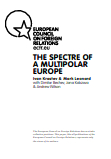
The EU’s ‘unipolar moment’ is over. In the 1990s, the EU’s grand hope was that American hard power would underpin the spread of European soft power and the integration of all Europe’s powers into a liberal order – embodied in NATO and the EU – in which the rule of law, pooled sovereignty and interdependence would gradually replace military conflict, the balance of power and spheres of influence. However, the prospects for this unipolar multilateral European order are fading. The dilemma facing the European Union in its own continent is somewhat similar to that faced by the US at a global level. The EU can do little to prevent Europe’s evolution from a unipolar to a multipolar order; but it can do a lot to shape the relations between its emerging poles. The new approach would take advantage of a political opening created by Moscow’s desire to modernise and Turkey’s search for a regional role, and recast the continent’s institutional order for a world in which Europe is increasingly peripheral and in which a weak neighbour can be as frightening as a strong one. It would be the first step towards creating a trilateral rather than a tripolar Europe: a new institutional order in the continent that (to paraphrase Lord Ismay) keeps the EU united, Russia post-imperial and Turkey European.
More...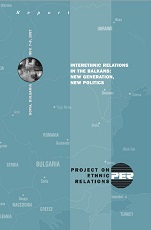
TABLE OF CONTENTS // Preface // Note on Terminology // Introductory Remarks // Problems of Regional Identity: Images of the Balkans // Managing Ethnic Conflict // Regional Aspirations and Cooperation // Roles of the EU and the International Community // Conclusions // List of Participants
More...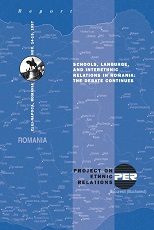
TABLE OF CONTENTSPreface // The Background // National Minorities in Romania: The Constitutional Framework // Undermining Constitutional Guarantees Through Legislation // The 1995 Education Law (NO. 84/1995) // The Education Decree of 1997 // Summary of the Discussion on the Use of Minority Languages // in Education in Romania // University Education in the Hungarian Language // List of Participants
More...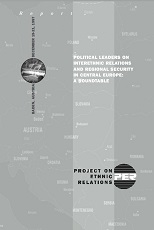
TABLE OF CONTENTS Preface Introduction Recent Regional Developments The Consequences of The Madrid Summit Effects of the Problems in the Balkans A Romanian Model of Inclusion Reconstructing Bicultural and Multicultural Values Interethnic Relations in Slovakia The U.S. Role in the New Europe Ukraine and Moldova Conclusions List of Participants
More...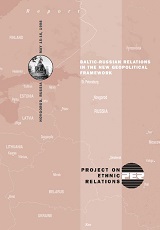
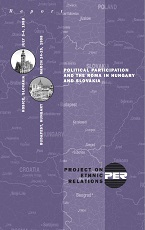
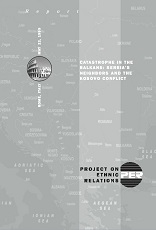
The meeting that is the subject of this report took place on May 22, 1999, in Rome, at the height of the expulsion of the Kosovar Albanians by Serb forces and the air war conducted by the NATO alliance. The atmosphere was one of suspense, alarm, and determination. Would the Yugoslav political and military leadership ultimately surrender to NATO’s bombing, or would the consensus among NATO members unravel—some had already proposed a bombing halt— because of Yugoslav resistance and Western revulsion over casualties among Serb civilians? Would the bombing stop or accelerate the expulsions in Kosovo? Was a land war inevitable? How much more damage would a continuation of the war do to relations between NATO members and Russia? What would be the fate of Yugoslavia’s neighbors? And of Serbia and Kosovo? What would be the state of interethnic relations in the region at war’s end?
More...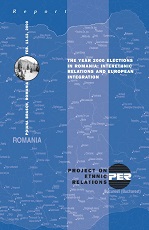
Despite the difficulties that have beset Romania in its transition from communism to democracy, it boasts a most important success in interethnic relations. Few would have predicted, after the disastrous violence between Romanians and ethnic Hungarians in Tirgu Mures in 1990, that only six years later the ethnic Hungarian party would be a respected member of Romania’s governing coalition.The Project on Ethnic Relations was an active participant in bringing about this result, initiating the first discussions and negotiations between leaders of the preceding government and the Hungarian minority, and replacing confrontation with a pattern of dialogue that persists to this day. The achievement, however, is untested by time. With the year 2000 elections underway in Romania, ethnic issues are already being raised in the campaign.
More...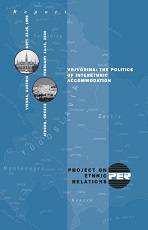
This preface to the account of discussions between the Serbian democratic opposition and leaders of the Vojvodina ethnic communities about the future of Vojvodina is being written in June 2000. We do not know how much longer the Milosevic regime will remain in power, but sooner or later it will collapse. Its most deplorable legacy will be the deliberate and systematic destruction of the fragile interethnic accommodation that had once characterized the region. Much of the resulting suffering and damage is beyond repair any time in the near future: It is difficult even to conceive of normal relations between Serbs and Kosovar Albanians before another lifetime goes by.Nevertheless, Serbia remains a multiethnic country. If the Serbian democratic opposition is to succeed, it needs to work with the minorities. It needs their support and their votes now, and it needs to come to power prepared with a fair and effective minorities policy. The minorities, in turn, need a democratic future.
More...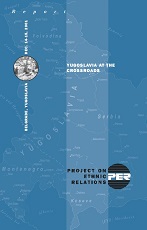
On December 14-15, 2001, senior Yugoslav, Serbian and Montenegrin politicians, as well as Serb leaders from Croatia, Bosnia and Kosovo, met with political leaders and high-level officials from Albania, Bosnia, Croatia, Greece, Hungary, Macedonia, Romania and the United States. Senior officials from the European Union (EU), the Organization for Security and Cooperation in Europe (OSCE) and the United Nations (UN) also took part. The meeting, entitled “The New Yugoslavia and Its Neighbors: A Regional Dialogue,” was held in Belgrade and marked the start of a new Project on Ethnic Relations (PER) initiative, called “Serbs and Their Neighbors.” This new PER series complements another, started in April 2000, called “Albanians and Their Neighbors.”Their goal is to sustain a serious regional discussion about the two most pressing ethno-political issues in Europe today.The meeting was held one year after the democratic change took place in Belgrade. The destructive regime of Slobodan Milosevic was toppled, beginning a new era not only for Yugoslavia but for the entire region. Yugoslav democratic forces had endured a decade of grave conditions and are now trying to lead the country back into the European family.
More...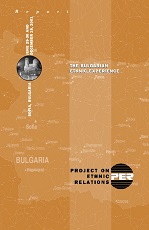
This is a report of two discussions that took place in Sofia, Bulgaria, on June 29-30 and December 18, 2001, respectively, between Bulgarian government and party leaders and the leaders of the Movement for Rights and Freedoms (MRF), Bulgaria’s predominantly ethnic Turkish party. Bulgaria is home to one of the most unusual interethnic arrangements in Southeastern Europe. The leadership of the large (almost 10 per cent of the population) Turkish minority, which might be expected by some to be militant in pressing for special status and protections along ethnic lines, has instead announced its intention to pursue a civic model as the basis for its efforts to improve the conditions in which that country’s Turks and Pomaks (Bulgarian-speaking Muslims) live. To Americans and others accustomed to the notion of a social order that treats its members as individual citizens first and only then as members of ethnic groups, this will sound quite familiar. But in the complex ethnic worlds of this region, it is a unique exception that merits special attention. For example, Hungarians living outside Hungary, who make up Central Europe’s largest minority, conduct highly organized political campaigns in Romania, Slovakia and Serbia, with the aim of maintaining and strengthening Hungarian cultural identity. And the Albanians in Kosovo, Macedonia, and south Serbia have gone to war with their neighbors over the issue of their rights and status.
More...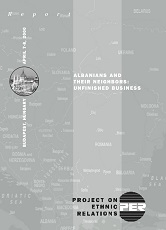
On April 7 and 8, 2000, senior Albanian politicians from Albania, Kosovo, Macedonia, and Montenegro met with leaders of the democratic opposition in Serbia and leaders of the Kosovar Serb community; other political leaders from Macedonia and Montenegro; and representatives from Bulgaria, Greece, Hungary, Italy, Romania, the United States, the Council of Europe, the Stability Pact for South Eastern Europe, the OSCE, the European Union, NATO, and the United Nations. This unprecedented meeting, which was held in Budapest, Hungary, marked the start of a major initiative by the Project on Ethnic Relations on “Albanians and Their Neighbors.” It is aimed at maintaining a region-wide, high-level dialogue on the most explosive ethnic-political issue in Europe today. This report captures and records the main theme of this opening discussion: the conflicting hopes and fears of diverse ethnic communities during a period of rapid and often violent change in the Balkans. Three issues dominated the meeting: the current and future status of Kosovo and its impact on the politics of the region; interethnic arrangements in Montenegro and Macedonia and the relations of Albanians with the majority populations in those republics; and whether Albanian leaders in the region aspire to the creation of a “Greater Albania.”
More...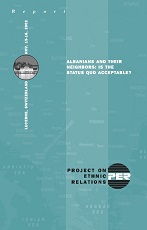
The interest of the Project of Ethnic Relations (PER) in the issue of Albanians and their neighbors goes back many years. In 1992, PER convened its first seminar for leading Albanian intellectuals from the region, to learn about their views on the interethnic situation in the Balkans. It was one of several consultations PER held with major ethnic communities in the Balkans at that time. In 1995, at a PER roundtable in Belgrade, PER brought together vice presidents of the Socialist Party of Serbia and the Democratic League of Kosovo, thus breaking a four-year self-imposed boycott by Kosovar Albanians on contacts with Belgrade. In 1997, PER brought Kosovo Albanian leaders and Belgrade officials to a landmark meeting in New York City, where they worked out a platform for future negotiations, but this process was interrupted when armed clashes broke out in 1998. After the 1999 Kosovo war, PER renewed its efforts in the form of a series of regional discussions for senior politicians from the Balkans under the heading “Albanians and Their Neighbors.” The first roundtable was organized in April 2000 in Budapest, with the assistance of the Government of Hungary. The second meeting took place in Athens in December of that year with support from the Greek Government. The third roundtable, which is the subject of this report, took place in Lucerne in November 2003, with the support and cooperation of the Swiss Federal Department of Foreign Affairs.
More...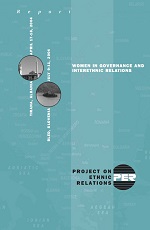
PER has been mediating interethnic disputes in the Balkans for over a decade, working closely with political leaders. The number of women occupying senior elective positions, although still disproportionately small (except in Kosovo where a quota is mandated by the international community), is nevertheless significant and growing. Against considerable odds, a group of exceptional women politicians, many of them young, has emerged—holding forth a promise of fresh approaches within this political neighborhood. Most are well-educated and have enjoyed significant international exposure. But they face exceptional challenges. Despite the lip service to women’s equality, political activities and public decision-making remain male-dominated arenas. PER does not subscribe to the cliché that women have a larger stake than men in avoiding violent conflict. Indeed, it would be naïve to suggest that women politicians automatically bring moderation to interethnic issues. Rather, the promise of women politicians lies elsewhere: their very participation introduces a new dimension—gender—to the list of variables that the political system must take into account in reckoning with constituencies.
More...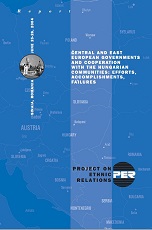
This essay on the status of the ethnic Hungarian minorities in Romania, Slovakia, Ukraine, and Serbia, was inspired by a meeting on that subject that was organized on June 25-26, 2004 in Sinaia, Romania. The event was sponsored by the new Project on Ethnic Relations Regional Center for Central, Eastern, and Southeastern Europe. The Center, with headquarters in Bucharest and with an additional office in Tirgu Mures, is a branch of the U.S.-based Project on Ethnic Relations (PER), which since 1991 has been the leading private-sector organization working on problems of interethnic relations in Romania and in the region. The meeting took place under the title Central and East European Governments and Cooperation with the Hungarian Communities: Efforts, Accomplishments, Failures. It brought together Hungarian and non-Hungarian leaders from the region to discuss the evolution of their relations since the end of the communist period and to consider how they might be further improved.
More...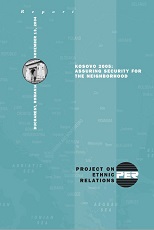
In the late summer and fall of 2004 the news from Kosovo was dominated by the run-up to the province’s parliamentary elections, which were held in October, and the question of whether the Kosovo Serbs would take part. While Serbian president Boris Tadic encouraged Kosovo’s Serbs to participate in the elections (though at the very last moment), prime minister Vojislav Kostunica, arguing that Kosovo’s provisional government had failed to protect the Serb community, strongly urged a boycott, and, in the event, on October 23 less than one percent of the Serbs living in Kosovo turned out to vote. On the heels of this development, which seemed to promise continued difficulties in the relationship between Albanians and Serbs in Kosovo, the Project on Ethnic Relations (both through its Princeton headquarters and its Center for Central, East, and Southeast Europe in Bucharest) together with the Romanian Ministry of Foreign Affairs, organized a roundtable meeting on “Kosovo 2005: Assuring Security for the Neighborhood.” The meeting, which was held in Bucharest, took up issues of Kosovo’s political dynamics, including Serb participation in Kosovo’s provisional institutions of self-government, implementation of United Nations standards for Kosovo, ways to approach the issue of Kosovo’s status, relations between Belgrade and Pristina and the impact of developments in Kosovo on regional security. At the time of the meeting Kosovo’s new coalition government had not yet been formed, and neighboring states sought a chance to communicate with leaders from both Pristina and Belgrade about how resolution of the province’s political status might move forward, and how the open issue of Kosovo affects a region that is eager for increased stability and, ultimately, European integration.
More...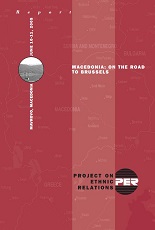
In June 2005, the Project on Ethnic Relations (PER) and the Embassy of Switzerland in Macedonia organized the fifth roundtable in the so-called “Mavrovo Process” series. These roundtables are an occasion for members of the Macedonian governing coalition (the Together for Macedonia coalition headed by the Social Democratic Union of Macedonia (SDSM) and the Democratic Union for Integration (DUI)), the parliamentary opposition and representatives of the international community to assess the implementation of the Ohrid Framework Agreement (OFA) and evaluate the coalition’s progress. The discussions also provide a forum for honest and open communication—off the record—among all parliamentary parties. The Mavrovo roundtables are always important events in Macedonian politics. They provide a forum wherein difficult and sometimes contentious issues of Macedonia’s daily politics can be discussed in a neutral space, free of everyday political pressures. In fact, coffee breaks, lunches and dinners between the sessions often turn out to be just as important as the plenary sessions themselves, as these provide chances for the participants to continue their discussions and build the trust necessary for reaching compromises. The Mavrovo series has also become a major channel for the political parties of Macedonia’s smaller ethnic communities. They use this unique opportunity to present their case to the other coalition members and to receive a sympathetic hearing.
More...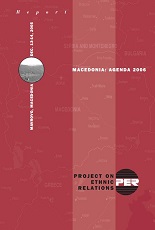
The December 2005 Mavrovo roundtable came at a historic moment for Macedonia. Having received a positive evaluation on Macedonia from the European Commission in November, the EU’s Council of Ministers was set to grant the country EU candidate status—a major milestone for a state still dealing with the consequences of a violent ethnic conflict in 2001. However, on December 12, the day before the beginning of the Mavrovo talks, the news from Brussels was that the Council, troubled by such setbacks as the recent French and Dutch popular rejection of a new European constitution and the continuing stalemate in budget negotiations, might vote to delay a decision on Macedonia’s candidacy until the next EU Presidency. This potential uncertainty over the country’s EU prospects sent shockwaves through Macedonia’s political scene. While the potential for a delay in Macedonia’s EU candidacy dominated much of the discussion at Mavrovo, other questions, such as the upcoming 2006 parliamentary elections and the implementation of certain reforms related to the Ohrid Framework Agreement, were also significant topics of discussion. Even these issues were seen by many participants as highly connected to the developments in Brussels, however, and Macedonia’s EU candidacy returned time and again in the discussions as the dominant outside factor shaping the country’s immediate future. This Mavrovo roundtable, the sixth since the series began in 2003, was characterized by a high degree of consensus. No participant disputed that European integration should be one of the state’s top priorities; to the contrary, some opposition leaders claimed that their parties, rather than the current government, should in fact be credited with paving the way to the country’s expected EU candidacy. The question of election irregularities was also an important agenda item on which there was broad agreement, with many participants supporting tougher penalties for violators, as well as reforms to the election law and the makeup of the election commission to improve the quality of the campaigns and the voting process itself.
More...